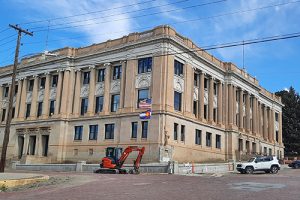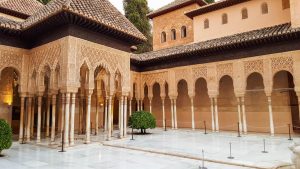WALSEN CAMP — During the 1913-14 coal strike in Huerfano County, something known as “closed camps” occurred. Buildings in a coal camp around a mine site, including miners’ houses, were on land owned by the coal company. Walsen Camp especially was truly a “closed camp” as it was enclosed by a fence put up at the beginning of the strike. Rouse and Cameron were partly enclosed by fences. All persons entering these camps were required to have a pass; in other words, this was a way to keep out union organizers. But then in July 1914, these closed camps were affected in another way. The Huerfano County Board of Commissioners changed election precincts so that each camp became an election precinct, even protected by armed guards. So these election precincts were on “the private grounds and under the private control of a coal corporation, which autocratically declared who should and who should not enter… .” These words are quoted from a decision of the Colorado Supreme Court. After the Supreme Court took testimony about the election of November 1914, the court unseated Jeff Farr, Republican candidate for re-election as sheriff. He had referred to himself as the King of Huerfano County and worked with and for the coal companies. On election day, the Democratic candidate for sheriff, E. L. Neelley, had to get a detail of Federal soldiers to escort the Democratic watchers and challengers to the polls at Walsen camp. The court noted the election registration lists in these closed camps were kept within the private offices of the coal companies and used as their private property. Testimony also revealed that in these closed precincts, many who voted were unable to read English so the election judges marked the ballots for them. The words “industrial necessity” were often used by the coal company officers as the reason for having the closed precincts. The court scoffed at this. The Colorado Supreme Court found that the plain purpose of the formation of the new precincts was so that the coal companies might control the elections in order to have their candidates elected. The court annulled the votes in seven of the closed camps; therefore Sheriff J.B. Farr was not the elected sheriff and E. L. Neelley had the most votes and was thus the duly elected sheriff. This court’s decision came in June 1916; by then Farr had served more than half of the contested term. He died about four years later. Information is from the postscript of the book King Coal by Upton Sinclair, in which he quotes part of the 10,000-word decision of the Colorado Supreme Court.

Breaking news: Results of Walsenburg Mayor race and recall election
Gary M. Vezzani was elected Walsenburg’s mayor in Tuesday’s special mayoral election/recall vote. Preliminary results announced Tuesday night show that both Nick Vigil in Ward



